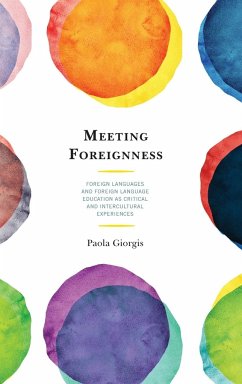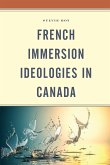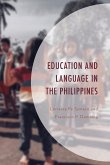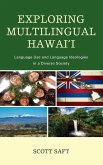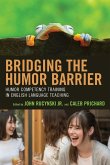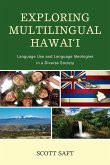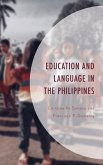Paola Giorgis
Meeting Foreignness
Foreign Languages and Foreign Language Education as Critical and Intercultural Experiences
Paola Giorgis
Meeting Foreignness
Foreign Languages and Foreign Language Education as Critical and Intercultural Experiences
- Gebundenes Buch
- Merkliste
- Auf die Merkliste
- Bewerten Bewerten
- Teilen
- Produkt teilen
- Produkterinnerung
- Produkterinnerung
The purpose of the book is to highlight the critical and intercultural potential of foreign languages and foreign language education. The book addresses the complexity of the experience of (foreign) languages and offers both theoretical interdisciplinary suggestions and applied examples of activities.
Andere Kunden interessierten sich auch für
![French Immersion Ideologies in Canada French Immersion Ideologies in Canada]() Sylvie RoyFrench Immersion Ideologies in Canada54,99 €
Sylvie RoyFrench Immersion Ideologies in Canada54,99 €![Education and Language in the Philippines Education and Language in the Philippines]() Lorraine Pe SymacoEducation and Language in the Philippines48,99 €
Lorraine Pe SymacoEducation and Language in the Philippines48,99 €![Exploring Multilingual Hawai'i Exploring Multilingual Hawai'i]() Scott SaftExploring Multilingual Hawai'i137,99 €
Scott SaftExploring Multilingual Hawai'i137,99 €![Transcultural Flows of English and Education in Asian Contexts Transcultural Flows of English and Education in Asian Contexts]() Transcultural Flows of English and Education in Asian Contexts123,99 €
Transcultural Flows of English and Education in Asian Contexts123,99 €![Bridging the Humor Barrier Bridging the Humor Barrier]() Bridging the Humor Barrier51,99 €
Bridging the Humor Barrier51,99 €![Exploring Multilingual Hawai'i Exploring Multilingual Hawai'i]() Scott SaftExploring Multilingual Hawai'i51,99 €
Scott SaftExploring Multilingual Hawai'i51,99 €![Education and Language in the Philippines Education and Language in the Philippines]() Lorraine Pe SymacoEducation and Language in the Philippines113,99 €
Lorraine Pe SymacoEducation and Language in the Philippines113,99 €-
-
-
The purpose of the book is to highlight the critical and intercultural potential of foreign languages and foreign language education. The book addresses the complexity of the experience of (foreign) languages and offers both theoretical interdisciplinary suggestions and applied examples of activities.
Hinweis: Dieser Artikel kann nur an eine deutsche Lieferadresse ausgeliefert werden.
Hinweis: Dieser Artikel kann nur an eine deutsche Lieferadresse ausgeliefert werden.
Produktdetails
- Produktdetails
- Verlag: Lexington Books
- Seitenzahl: 144
- Erscheinungstermin: 15. Oktober 2018
- Englisch
- Abmessung: 235mm x 157mm x 13mm
- Gewicht: 370g
- ISBN-13: 9781498560504
- ISBN-10: 1498560504
- Artikelnr.: 53693921
- Herstellerkennzeichnung
- Libri GmbH
- Europaallee 1
- 36244 Bad Hersfeld
- gpsr@libri.de
- Verlag: Lexington Books
- Seitenzahl: 144
- Erscheinungstermin: 15. Oktober 2018
- Englisch
- Abmessung: 235mm x 157mm x 13mm
- Gewicht: 370g
- ISBN-13: 9781498560504
- ISBN-10: 1498560504
- Artikelnr.: 53693921
- Herstellerkennzeichnung
- Libri GmbH
- Europaallee 1
- 36244 Bad Hersfeld
- gpsr@libri.de
Paola Giorgis teaches English language, literature and visual arts in Italian high schools and holds a PhD in anthropology of education and intercultural education. More info at: - https://centerforinterculturaldialogue.org/?s=giorgis - http://researching-multilingually-at-borders.com/?page_id=1818 - wom.an.ed - women's studies in anthropology and education www.womaned.org
Introduction The Missing Link: Presenting What, How, from Where and to Whom
Part One Within Praxis 1. The Context 1.1 Made in Italies 1.2 Native or
Foreign? 1.3 Languages, Identities, Migrations 2. The Educational
Perspective 2.1 The Activities 2.1.1 Intercultural Grammar 2.1.2
Intercultural Poetry 2.1.3 Intercultural Citizenship 2.1.4 A Comment on the
Activities Part Two Within Theory 1. Introduction: What's in a Word? 2.
Foreign 3. Language 3.1 mOther tongue 3.2 Other Languages 3.3 Language and
Power 4. Education 4.1 Critical Pedagogies 5. Critical 6. Intercultural 6.1
Intercultural Education 7. Experience Part Three Within Research 1.
Introducing the Research Study 2. The Contexts 3. The Participants 4.
Methodology and Data Collecting 4.1 General Considerations on Methodology
4.2 Data Collecting: Sampling 4.3 Some Issues Regarding Data Collecting
4.3.1 In/Out Issue 4.3.2 Objectivity/Subjectivity 4.3.3 Ethical Issues 4.4
Interviews and Back-talk Focus Groups 4.4.1 Motivation and Procedures 4.4.2
Theoretical References 5. Analysis of Data 5.1 Main Principles 5.1.1
Reflexivity 5.1.2 Text Construction and Rhetorical Figures 5.1.3 Dialogue
Between the Data and the Framework 5.1.4 Triangulation and Accountability
6. The Findings 7. Discussion 7.1 On the Study 7.2 On the Research Methods
Part Four Meeting Foreignness. Foreign Language Education as a Critical
(and) Intercultural Experience 1. Meeting Foreignness 2. Foreign Language
Education as a Critical (and) Intercultural Experience 2.1 English and
English Language Teaching 2.2 English as a Foreign Language and English as
a Lingua Franca 2.3 English as a Lingua Franca and English Language
Teaching. An Impossible Match? 3. Foreign Languages and the Intercultural
4. What's Next? 4.1 How to Do It A Final Note The Bigger Picture. A Few
Remarks on Some fin-de-siècle Fascinations
Part One Within Praxis 1. The Context 1.1 Made in Italies 1.2 Native or
Foreign? 1.3 Languages, Identities, Migrations 2. The Educational
Perspective 2.1 The Activities 2.1.1 Intercultural Grammar 2.1.2
Intercultural Poetry 2.1.3 Intercultural Citizenship 2.1.4 A Comment on the
Activities Part Two Within Theory 1. Introduction: What's in a Word? 2.
Foreign 3. Language 3.1 mOther tongue 3.2 Other Languages 3.3 Language and
Power 4. Education 4.1 Critical Pedagogies 5. Critical 6. Intercultural 6.1
Intercultural Education 7. Experience Part Three Within Research 1.
Introducing the Research Study 2. The Contexts 3. The Participants 4.
Methodology and Data Collecting 4.1 General Considerations on Methodology
4.2 Data Collecting: Sampling 4.3 Some Issues Regarding Data Collecting
4.3.1 In/Out Issue 4.3.2 Objectivity/Subjectivity 4.3.3 Ethical Issues 4.4
Interviews and Back-talk Focus Groups 4.4.1 Motivation and Procedures 4.4.2
Theoretical References 5. Analysis of Data 5.1 Main Principles 5.1.1
Reflexivity 5.1.2 Text Construction and Rhetorical Figures 5.1.3 Dialogue
Between the Data and the Framework 5.1.4 Triangulation and Accountability
6. The Findings 7. Discussion 7.1 On the Study 7.2 On the Research Methods
Part Four Meeting Foreignness. Foreign Language Education as a Critical
(and) Intercultural Experience 1. Meeting Foreignness 2. Foreign Language
Education as a Critical (and) Intercultural Experience 2.1 English and
English Language Teaching 2.2 English as a Foreign Language and English as
a Lingua Franca 2.3 English as a Lingua Franca and English Language
Teaching. An Impossible Match? 3. Foreign Languages and the Intercultural
4. What's Next? 4.1 How to Do It A Final Note The Bigger Picture. A Few
Remarks on Some fin-de-siècle Fascinations
Introduction The Missing Link: Presenting What, How, from Where and to Whom
Part One Within Praxis 1. The Context 1.1 Made in Italies 1.2 Native or
Foreign? 1.3 Languages, Identities, Migrations 2. The Educational
Perspective 2.1 The Activities 2.1.1 Intercultural Grammar 2.1.2
Intercultural Poetry 2.1.3 Intercultural Citizenship 2.1.4 A Comment on the
Activities Part Two Within Theory 1. Introduction: What's in a Word? 2.
Foreign 3. Language 3.1 mOther tongue 3.2 Other Languages 3.3 Language and
Power 4. Education 4.1 Critical Pedagogies 5. Critical 6. Intercultural 6.1
Intercultural Education 7. Experience Part Three Within Research 1.
Introducing the Research Study 2. The Contexts 3. The Participants 4.
Methodology and Data Collecting 4.1 General Considerations on Methodology
4.2 Data Collecting: Sampling 4.3 Some Issues Regarding Data Collecting
4.3.1 In/Out Issue 4.3.2 Objectivity/Subjectivity 4.3.3 Ethical Issues 4.4
Interviews and Back-talk Focus Groups 4.4.1 Motivation and Procedures 4.4.2
Theoretical References 5. Analysis of Data 5.1 Main Principles 5.1.1
Reflexivity 5.1.2 Text Construction and Rhetorical Figures 5.1.3 Dialogue
Between the Data and the Framework 5.1.4 Triangulation and Accountability
6. The Findings 7. Discussion 7.1 On the Study 7.2 On the Research Methods
Part Four Meeting Foreignness. Foreign Language Education as a Critical
(and) Intercultural Experience 1. Meeting Foreignness 2. Foreign Language
Education as a Critical (and) Intercultural Experience 2.1 English and
English Language Teaching 2.2 English as a Foreign Language and English as
a Lingua Franca 2.3 English as a Lingua Franca and English Language
Teaching. An Impossible Match? 3. Foreign Languages and the Intercultural
4. What's Next? 4.1 How to Do It A Final Note The Bigger Picture. A Few
Remarks on Some fin-de-siècle Fascinations
Part One Within Praxis 1. The Context 1.1 Made in Italies 1.2 Native or
Foreign? 1.3 Languages, Identities, Migrations 2. The Educational
Perspective 2.1 The Activities 2.1.1 Intercultural Grammar 2.1.2
Intercultural Poetry 2.1.3 Intercultural Citizenship 2.1.4 A Comment on the
Activities Part Two Within Theory 1. Introduction: What's in a Word? 2.
Foreign 3. Language 3.1 mOther tongue 3.2 Other Languages 3.3 Language and
Power 4. Education 4.1 Critical Pedagogies 5. Critical 6. Intercultural 6.1
Intercultural Education 7. Experience Part Three Within Research 1.
Introducing the Research Study 2. The Contexts 3. The Participants 4.
Methodology and Data Collecting 4.1 General Considerations on Methodology
4.2 Data Collecting: Sampling 4.3 Some Issues Regarding Data Collecting
4.3.1 In/Out Issue 4.3.2 Objectivity/Subjectivity 4.3.3 Ethical Issues 4.4
Interviews and Back-talk Focus Groups 4.4.1 Motivation and Procedures 4.4.2
Theoretical References 5. Analysis of Data 5.1 Main Principles 5.1.1
Reflexivity 5.1.2 Text Construction and Rhetorical Figures 5.1.3 Dialogue
Between the Data and the Framework 5.1.4 Triangulation and Accountability
6. The Findings 7. Discussion 7.1 On the Study 7.2 On the Research Methods
Part Four Meeting Foreignness. Foreign Language Education as a Critical
(and) Intercultural Experience 1. Meeting Foreignness 2. Foreign Language
Education as a Critical (and) Intercultural Experience 2.1 English and
English Language Teaching 2.2 English as a Foreign Language and English as
a Lingua Franca 2.3 English as a Lingua Franca and English Language
Teaching. An Impossible Match? 3. Foreign Languages and the Intercultural
4. What's Next? 4.1 How to Do It A Final Note The Bigger Picture. A Few
Remarks on Some fin-de-siècle Fascinations

